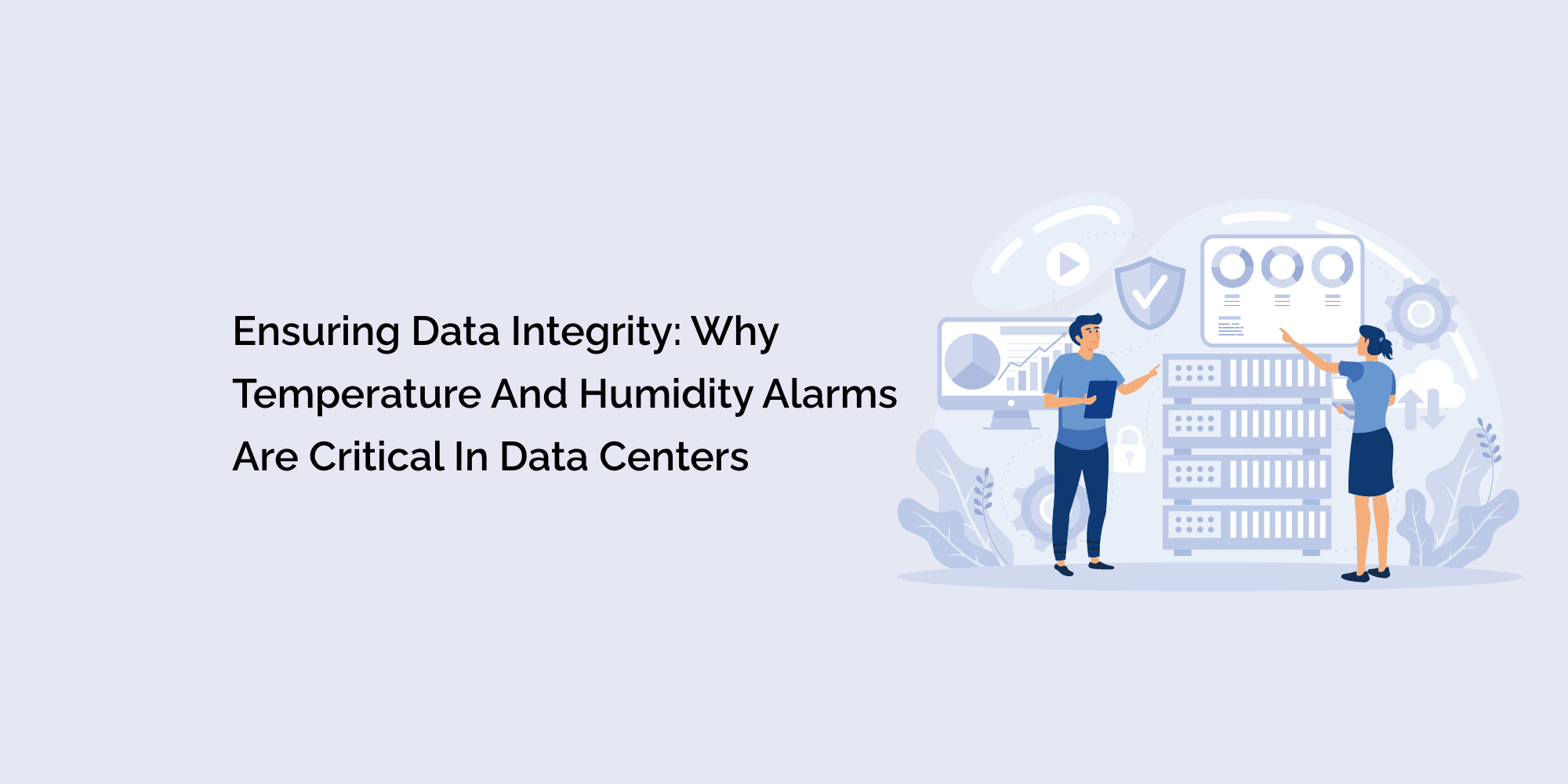Data centers are the backbone of modern technology, housing critical equipment and systems that store and process vast amounts of data. The proper functioning of these data centers is vital to ensure data integrity and prevent costly disruptions. Temperature and humidity are two key environmental factors that can significantly impact the performance and longevity of data center equipment. This blog will explore why temperature and humidity alarms play a crucial role in data centers, ensuring data integrity, minimizing downtime, and optimizing operational efficiency.
The Impact of Temperature on Data Center Equipment
Temperature fluctuations can have a detrimental impact on data center equipment. High temperatures can lead to overheating, causing accelerated wear and tear, reduced lifespan of components, and increased risk of hardware failures. On the other hand, shallow temperatures can cause condensation, leading to corrosion and potential short circuits. Temperature alarms enable data center managers to monitor and maintain optimal temperature levels, ensuring the reliability and performance of critical equipment.
The Role of Humidity in Data Center Environments
Humidity is another critical factor that can affect data center operations. High humidity levels can lead to condensation, posing risks to sensitive electronic components and causing corrosion. On the other hand, low humidity levels can result in static electricity buildup, which increases the likelihood of equipment damage. Humidity alarms provide real-time monitoring and alerts, allowing data center operators to maintain optimal humidity conditions and mitigate potential risks.
Preventing Equipment Failures and Downtime
Temperature and humidity alarms are essential for preventing equipment failures and minimizing downtime in data centers. By continuously monitoring these environmental parameters, alarm systems can detect deviations from the ideal ranges and issue real-time alerts. Prompt notifications enable data center managers to take immediate corrective actions, such as adjusting cooling systems or addressing humidity imbalances, before they lead to critical equipment failures or service disruptions.
Protecting Data Integrity and Reducing the Risk of Data Loss
Maintaining proper temperature and humidity levels is crucial for safeguarding data integrity. Fluctuations in environmental conditions can compromise the integrity of stored data, leading to data corruption or loss. Temperature and humidity alarms help ensure a stable and controlled environment, reducing the risk of data degradation or permanent data loss due to environmental factors.
Optimizing Energy Efficiency and Cost Savings
Temperature and humidity alarms contribute to data center reliability and play a significant role in optimizing energy efficiency. By close monitoring and controlling environmental conditions, data center operators can fine-tune cooling and humidity control systems to operate optimally. This results in reduced energy consumption, lower operational costs, and improved efficiency.
Compliance with Industry Standards and Regulations
Data centers are subject to industry standards and regulations that govern environmental conditions. Temperature and humidity alarms help data centers meet these compliance requirements by ensuring that temperature and humidity levels are consistently maintained within the prescribed ranges. Compliance helps avoid penalties and ensures that data center operations adhere to best practices for data protection and equipment longevity.
Advanced Features and Integration Capabilities
Current temperature and humidity alarm systems offer advanced features and integration capabilities. These systems provide real-time monitoring, customizable alert thresholds, and remote access through user-friendly interfaces. Integration with data center management systems allows for centralized control and comprehensive environmental management.
Proactive Maintenance and Predictive Analytics
Temperature and humidity alarm systems can go beyond simple monitoring and alerting. Some advanced systems offer proactive maintenance features and predictive analytics. By analyzing historical data and environmental trends, these systems can provide insights for predictive maintenance, helping data center managers identify potential risks and optimize maintenance schedules.
Choosing the Right Temperature and Humidity Alarm System
The right temperature and humidity alarm system is crucial for data center operators. Consider factors such as accuracy, reliability, real-time monitoring and alerting capabilities, remote access, integration options, scalability, user-friendliness, and support. Evaluating these factors ensures that the chosen alarm system aligns with the specific needs and requirements of the data center.
Certainly! Here are some frequently asked questions (FAQs) about temperature and humidity alarms in data centers:
Why are temperature and humidity alarms important in data centers?
Temperature and humidity alarms are crucial in data centers to monitor and maintain optimal environmental conditions. They help prevent equipment failures, minimize downtime, protect data integrity, and ensure energy efficiency.
How do temperature and humidity alarms work in data centers?
Temperature and humidity alarms use sensors to monitor environmental conditions continuously. If the temperature or humidity levels deviate from predefined thresholds, the alarm system triggers alerts through various means, such as email notifications or visual alarms.
What are the consequences of inadequate temperature and humidity control in data centers?
Inadequate temperature and humidity control can lead to equipment overheating, condensation, corrosion, and static electricity buildup. These issues can result in equipment failures, data loss, service disruptions, and increased energy consumption.
Conclusion
Temperature and humidity alarms play a critical role in data centers by ensuring data integrity, minimizing downtime, and optimizing operational efficiency. By continuously monitoring and controlling environmental conditions, data center operators can proactively prevent equipment failures, protect data integrity, maximize energy efficiency, and meet compliance requirements. Choosing the right temperature and humidity alarm system is critical to maintaining a stable and controlled data center environment. With advanced features, integration capabilities, and proactive maintenance options, these alarm systems empower data center managers to mitigate risks, improve reliability, and ensure the smooth operation of their critical infrastructure. Invest in temperature and humidity alarms to safeguard your data center and maintain the highest data integrity standards.








